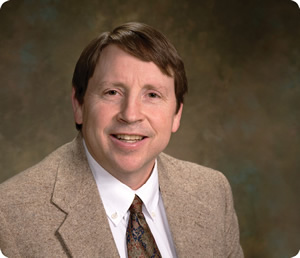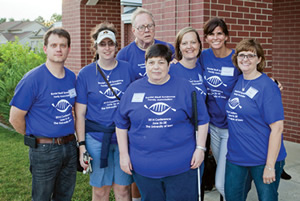Clinic sets up registry for rare children's disease
Marshfield Clinic has taken a leadership role in treating young patients with an extremely rare genetic disease.
 Clinical Registry Investigating Bardet Biedl Syndrome (CRIBBS) will be under the direction of Robert Haws, M.D., a pediatric nephrologist and director of the Clinical Research Center of Marshfield Clinic Research Institute.
Clinical Registry Investigating Bardet Biedl Syndrome (CRIBBS) will be under the direction of Robert Haws, M.D., a pediatric nephrologist and director of the Clinical Research Center of Marshfield Clinic Research Institute. Beginning in 2013, the Clinic hosted several Bardet Biedl Syndrome Clinics that attracted families from all over the United States. Bardet Biedl Syndrome (BBS) is believed to be caused by a mutation, or change, in one or more of 14 genes inherited from a patient's parents.
Symptoms include a gradual loss of sight, obesity, kidney abnormalities, extra fingers or toes and other health issues. Less than 2,500 people in the United States have been diagnosed with BBS. These people, mostly children, usually can't get their care near their home because many times their local doctors don't know about BBS, and it requires a multitude of specialists working together.
To better serve these patients and their families, Marshfield Clinic has established the Clinical Registry Investigating Bardet Biedl Syndrome (CRIBBS). It's an innovative approach to addressing the problem of identifying enough research participants with a specific rare disease – in this case BBS – to encourage meaningful research. Research projects generally require large groups of patients so the results are meaningful and can be proven.
CRIBBS is a gathering of comprehensive medical data from those with BBS across the globe, said a parent of a child with BBS. Tim Ogden, president of the BBS Family Association, said a disease like BBS can be frustrating to parents because they receive so little information about the disease.
"You feel so isolated," Ogden said. "The most encouraging thing is knowing that somewhere there are people who are actually trying to figure it out and do something about it. But it's very hard for researchers to make progress if they have to spend all their time tracking down patients and learning about their medical histories and symptoms.
Patients and families with BBS who join CRIBBS will be interviewed extensively. Their responses, along with other test results, medical imaging and results from doctor visits, will all be entered into CRIBBS. To maintain confidentiality, information that could specifically identify a patient will be removed before the data is entered.
CRIBBS will allow researchers to follow a group of patients over time to assess how the disease impacts them. Scientists can determine if different treatments or medications have a positive outcome. With these findings they can react quicker and be proactive in their treatment plans for BBS patients.
"BBS is so complicated and varied that there is a real risk for anything we do that it will only work for some part of the BBS community, or it won't work at all," Ogden said. "And if we don't have a registry, when one thing doesn't work, we've got to do it all over again for the next research study."
CRIBBS will be under the direction of Robert Haws, M.D., a pediatric nephrologist who last June was awarded the first-ever BBS Family Association's hero award.
"I was talking to my son's nephrologist in Philadelphia," Ogden noted. "And he said, 'we should have done the registry.' Bob Haws and his team at Marshfield Clinic stepped up and put in the blood, sweat and tears to make it happen…and got it done."
Family Association supports Clinic efforts
 BBS Family Association members participated in a recent BBS conference, also attended by Dr. Robert Haws of Marshfield Clinic.
BBS Family Association members participated in a recent BBS conference, also attended by Dr. Robert Haws of Marshfield Clinic.
The Bardet Biedl Syndrome Family Association (BBSFA) has raised more than $60,000 to support the cost of getting people registered into the CRIBBS registry and to support a BBS treatment center at Marshfield Clinic. CRIBBS itself was created entirely through philanthropic support to Marshfield Clinic Research Institute by generous donors.
Collaborating with the Clinic's Development Department, BBSFA members are continuing to hold events close to their homes, including golf and "foot golf" events in Atlanta and Minneapolis.
At these events, the families create awareness and support by sharing their own personal stories about their journey with BBS and why they are supporting CRIBBS. Now numbering more than 250 members, the BBSFA shares information and raises funds to support their cause.
BBSFA is an important lifeline for families with a syndrome so rare that they may not have ever met another family dealing with BBS, without the association.
"What we really want is something that makes our children's' lives better, and deals with some of the symptoms they have. That is why we put all of the time and energy into planning events like these and supporting CRIBBS," said Tim Ogden, president of the group.
The BBSFA needs additional funding to continue supporting research. To make a gift, contact Teri Wilczek at 1-800-858-5220. For more information about Bardet Biedl Syndrome Family Association, visit
www.Bardet Biedl.org.
